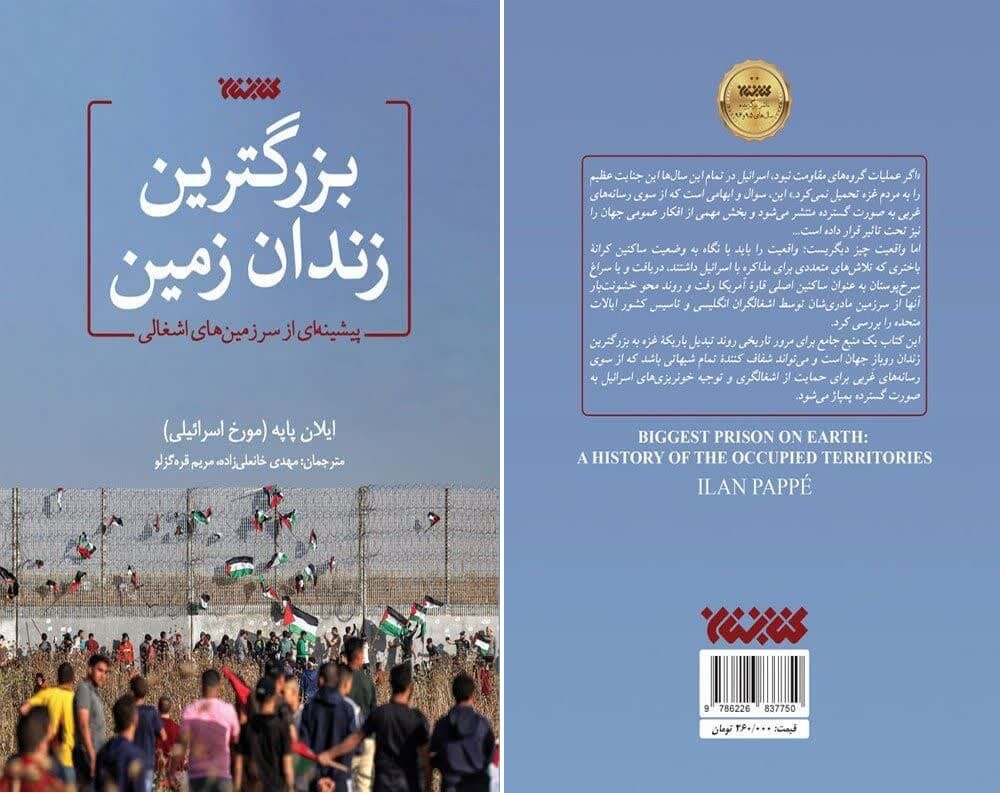Book by Israeli historian on occupied territories published in Persian

TEHRAN-The Persian translation of the book “The Biggest Prison on Earth” written by the Israeli historian Ilan Pappe has hit the Iranian bookstores.
Maryam Gharagozlou and Mehdi Khanalizadeh have translated the book, which is published by Ketabestan Publications, Mehr reported.
Following his critically acclaimed investigation of the ethnic cleansing of Palestine in the 1940s, renowned historian Pappe turns his attention to the annexation and occupation of Gaza and the West Bank in this book, bringing the readers the first comprehensive critique of the Occupied Territories.
Based on groundbreaking archival research, NGO records, and eyewitness accounts, Pappe's investigation of the “bureaucracy of evil” explores the brutalizing effects of occupation, from the systematic abuse of human and civil rights, the IDF roadblocks, mass arrests, and house searches to the forced population transfer, the settlers, and the infamous wall that is rapidly turning the West Bank into an open prison. Providing a sharp contrast with life in Israel, this is a brilliantly incisive and moving portrait of daily life in the Occupied Territories.
First published in 2016, “The Biggest Prison on Earth” exposes Israeli violations in Palestine against its indigenous people. The Israeli historian reveals Israel’s ugly crimes against humanity over the years, using clear-cut evidence that indicts the settler colonial entity. Pappe comprehensively analyzes Zionist objectives in occupied Palestine and the ethnic cleansing of the Palestinians in different historical epochs.
He begins by describing Israeli preparations made several years before 1967’s Six-Day War to control large portions of Palestine without formally annexing them and thereby granting civil rights to the Palestinians living there. Instead, with the imposition of Israeli rule, “the Palestinians living there were incarcerated for crimes they never committed and for offenses that were never committed, confessed, or defined.”
Pappe shows that the Israelis offered an “open-air prison” when the Palestinians were compliant and a “maximum security prison” when they offered any resistance. Both left them shorn of basic human rights but the latter also featured harsh punishments up to and including military attacks on civilians.
The author cites numerous violations of international law as well as generally duplicitous behavior by Israeli leaders toward other nations and international bodies, particularly during the Oslo Accord negotiations. Moreover, according to a 2016 U.N. report, Israel’s actions toward the Gaza Strip will render life there “unsustainable” by 2020. Pappe’s conclusions won’t be welcome in all quarters but this detailed history is rigorously supported by primary sources.
The Israeli historian’s work earned the 2017 Book of Palestine Award, and it was recently translated into Arabic.
He has dedicated his book to the children of Palestine who endured killing, injury, and bullying because they live in the biggest prison on earth.
Pappé, 69, is a professor with the College of Social Sciences and International Studies at the University of Exeter in the UK, director of the university's European Centre for Palestine Studies, co-director of the Exeter Centre for Ethno-Political Studies, and political activist. He was formerly a senior lecturer in political science at the University of Haifa (1984–2007) and chair of the Emil Touma Institute for Palestinian and Israeli Studies in Haifa (2000–2008).
Pappé is one of Israel's new historians who, since the release of pertinent British and Israeli government documents in the early 1980s, have been rewriting the history of Israel's creation in 1948, and the corresponding expulsion or flight of 700,000 Palestinians in the same year.
He has written that the expulsions were not decided on an ad hoc basis, as other historians have argued, but constituted the ethnic cleansing of Palestine, in accordance with Plan Dalet, drawn up in 1947 by Israel's future leaders. He blames the creation of Israel for the lack of peace in the Middle East, arguing that Zionism is more dangerous than Islamic militancy, and has called for an international boycott of Israeli academics.
His work has been both supported and criticized by other historians. Before he left Israel in 2008, he had been condemned in the Knesset, Israel's parliament; a minister of education had called for him to be sacked; his photograph had appeared in a newspaper at the center of a target; and he had received several death threats.
SS/SAB
